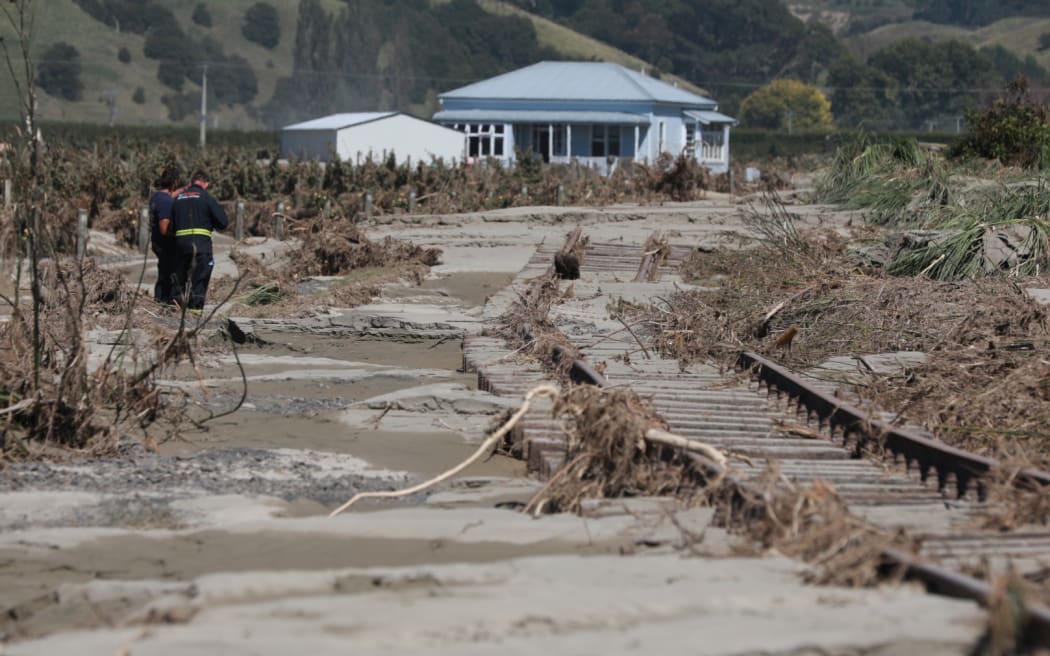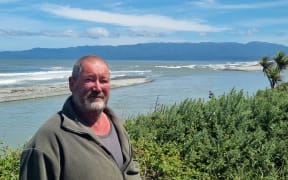
The scene in Esk Valley in Hawke's Bay after Cyclone Gabrielle. The country's run of weather disasters in 2023 has contributed to more despondency over the climate, an expert says. Photo: RNZ/ Nick Monro
While more than 80 percent of New Zealanders see climate change as a personal concern, for a small portion of the population it causes a level of worry so severe that it interferes with everyday life.
This is known as climate anxiety.
A clinical psychologist and co-convener of the New Zealand Psychological Society's climate taskforce, Dr Jackie Feather, is encountering more and more people suffering from the mental health condition, which she said made sense.
"You just need to think about what New Zealand's been experiencing recently with floods, slips, and then this summer it's hot.
"It's affecting us personally and I think it has people much more concerned than they were previously when it wasn't so obvious."
Dr Feather said people experiencing climate anxiety often struggled to sleep, concentrate, or complete everyday tasks.
Her daughter, Gabrielle Feather, suffered from climate anxiety while working at an environmental action group.
"I felt like I couldn't walk into a supermarket without having a panic attack because I couldn't find anything on the shelves that didn't have plastic covering it, or that was local or ethically sourced or that kind of thing.
"I found it really debilitating for a number of years."
Gabrielle Feather eventually left the world of advocacy to manage her mental health.
She now researches climate anxiety in Tasmania.
A growing concern
Dr Feather said climate anxiety wasn't common yet, but its prevalence was increasing.
In Australia, a recent survey by a youth mental health organisation found nearly 10 percent of the 19,000 respondents - all aged between 15 and 19 - reported experiencing 'high psychological distress' as a result of climate change.
And in the UK Lorraine Whitmarsh, an environmental psychologist at the University of Bath, led the first detailed study of climate anxiety among the country's adult population.
"We studied a representative sample of the public and we found that about four percent have modest or severe symptoms," adding that the representative sample included people of all ages, genders and ethnicities.
She was not surprised to learn that young people were disproportionately represented.
"There's still only a minority of young people that suffer from climate anxiety, but in that age group we did see a higher proportion at a statistically significant level.
"This was expected because climate change poses a real threat that the future will be worse, but also a feeling of powerlessness."
And there were other traits that appeared to predispose people to climate anxiety.
"We saw higher stats in people who already experience generalised anxiety, as well as people who come into frequent contact with media information about climate change," she said.
"Media exposure was actually the strongest predictor."
Dr Feather said young people were more likely to present with climate anxiety in New Zealand too.
"They're powerless," she said, echoing Professor Whitmarsh.
"They're looking to governments and people in power to make changes, but change is happening very slowly."
The presence of climate anxiety in society did not come as a surprise.
"It's a threat, and the human body is programmed to respond to threats," she said.
"We enter fight, flight, or freeze mode, but if we don't help people manage their heightened hypervigilance and hyper-physiological arousal, it can lead to all sorts of mental health problems."
'Unique challenge' for those working in mental health
Mental health professionals have a lot to learn about helping people with climate anxiety, Whitmarsh said.
"They're not really equipped to know how to deal with climate anxiety.
"They can deal with generalised anxiety, but that often relates to things the patient has a level of control over.
"Climate anxiety is a bit different because no amount of individual behaviour will have an impact on its trajectory.
"It presents a unique challenge for mental health professionals."
But Dr Feather said there has been some success with acceptance and commitment therapy.
A significant part of that approach involved focusing on the present moment.
"Climate change is a direct threat, and it's an existential threat," she said.
"But it's important to remember that 99 percent of the time we are perfectly safe.
"It's easy to get swept up in the existential crisis, but here I am sitting on Waiheke Island.
"It's a beautiful day, I can hear birds and the cicadas, and when I look out the window there's stunning native bush.
"We need to take time to pause and remind ourselves, there's still a lot of peace and beauty."






